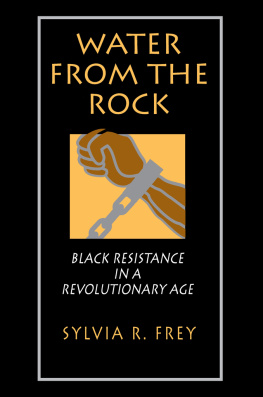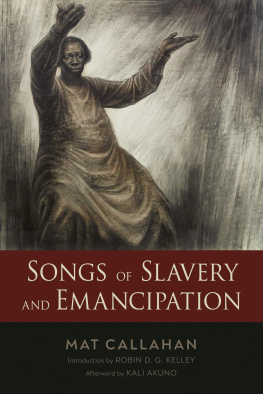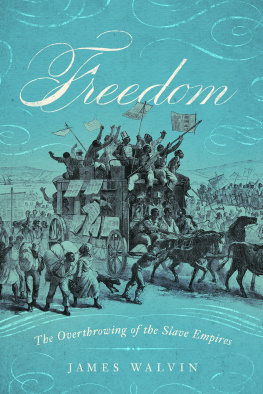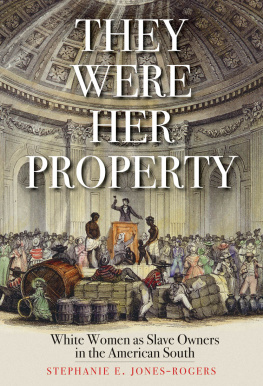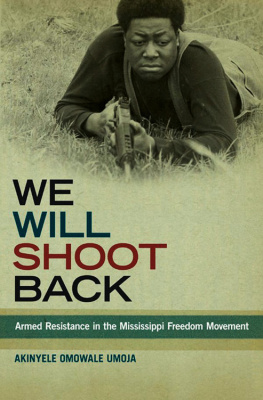WATER FROM THE ROCK
WATER FROM THE
ROCK
BLACK RESISTANCE IN A
REVOLUTIONARY AGE
Sylvia R. Frey
PRINCETON UNIVERSITY PRESS
PRINCETON, NEW JERSEY
COPYRIGHT 1991 BY PRINCETON UNIVERSITY PRESS
PUBLISHED BY PRINCETON UNIVERSITY PRESS, 41 WILLIAM STREET,
PRINCETON, NEW JERSEY 08540
IN THE UNITED KINGDOM: PRINCETON UNIVERSITY PRESS,
CHICHESTER, WEST SUSSEX
ALL RIGHTS RESERVED
LIBRARY OF CONGRESS CATALOGING-IN-PUBLICATION DATA
FREY, SYLVIA R., 1935-WATER FROM THE ROCK : BLACK RESISTANCE IN A REVOLUTIONARY AGE / SYLVIA R. FREY
P. CM.
INCLUDES BIBLIOGRAPHICAL REFERENCES AND INDEX.
ISBN 0-691-04784-7
ISBN 0-691-00626-1 (PBK.)
1. UNITED STATESHISTORYREVOLUTION, 17751783PARTICIPATION, AFRO-AMERICAN. 2. UNITED STATESHISTORYREVOLUTION, 17751783SOCIAL ASPECTS. 3. SOUTHERN STATESHISTORYREVOLUTION, 17751783PARTICIPATION, AFRO-AMERICAN. 4. SOUTHERN STATESHISTORYREVOLUTION, 17751783SOCIAL ASPECTS. 5. AFRO-AMERICANSSOUTHERN STATESHISTORY18TH CENTURY. 6. SOUTHERN STATESHISTORY17751865. 7. SLAVESSOUTHERN STATESHISTORY18TH CENTURY. I. TITLE.
E269.N3F74 1991 973.3150396073DC20 90-46655
eISBN: 978-0-691-21622-5
R0
TO THE MEMORY OF
Helen D., John H., and John David Frey
WHOSE LOVE WAS FOR ME
WATER FROM THE ROCK
Speak ye unto the rock before their eyes, that it give forth to
them water out of the rock
Numbers 20:8
ACKNOWLEDGMENTS
A LTHOUGH Water from the Rock bears my name as author, the book owes its existence to a number of colleagues, friends, and institutions, who contributed to it in various ways. To the extent that this work represents an achievement, it is theirs as much as mine. There are, of course, substantial areas of disagreement between me and even my kindest critics. I would, therefore, like to absolve them from all responsibility for the books shortcomings.
John B. Boles, who was the first person to read any part of the manuscript, helped me to believe in the project. Ira Berlin suggested a biracial approach. Peter H. Wood and Jeffrey Crow drew my attention to important sources and gave me encouragement and useful criticism. The anonymous readers of Princeton University Press read the manuscript with painstaking care that went far beyond the usual requirements. Their meticulous attention to detail saved me from embarrassing errors and helped me to clarify my own ideas and to focus the material more sharply. Betty Wood read the manuscript in its entirety, made very helpful comments, and shared several useful sources with me. Raymond Diamond and Liva Baker read parts of the manuscript and made significant suggestions. Nan Woodruff spent endless hours talking with me about it and gave judicious advice. My greatest debt is to Eugene D. Genovese for his thorough reading of the manuscript, for his urging me on at a discouraging stage of my work, for the example of his own exceptional scholarship, which has shaped significantly the scholarly debate of an entire generation. Gail Ullman, Social Science Editor of Princeton University Press, has been involved with this project from its inception. She has waited patiently for it to end and through all the years has been my trusted counselor and friend. I owe special thanks to my copy editor, Virginia Barker, who treated my manuscript as though it were her own.
I am also indebted to a number of institutions for financial support. The American Philosophical Society, Tulane Universitys Council on Research, the Murphy Institute of Political Economy, and the National Endowment for the Humanities awarded me summer stipends and travel grants to undertake research in British and American archives and libraries. A year in residence as a senior postdoctoral fellow at the Smithsonians National Museum of American History made it possible for me to engage in interdisciplinary research with the generous help and advice of museum curators, among them Theresa Singleton and Christine Mullen Kreamer of the Museum of Natural History, Roslyn Walker of the Museum of African Art, and Spencer Crew of the Museum of American History. The Research Facilities Office of the Library of Congress, particularly Bruce Martin, gave me office space where I could write and use the vast resources of the library. The Virginia Baptist Historical Society not only gave me access to their fine collection of Baptist church records, but provided me with convenient and comfortable housing on the University of Richmond campus.
The librarians and archivists at various institutions in Britain and the United States were, without exception, helpful and accommodating. The Archives and Manuscripts Division of the Virginia State Library, especially Brent Tarter, Phoebe Jacobsen of the Maryland State Archives, Wylma Wates of the South Carolina Department of Archives and History, and Mattie Russell of the Perkins Library of Duke University were especially cooperative in helping me to locate important records and in making manuscript collections available quickly and efficiently. I also wish to express my appreciation to the libraries and archives listed separately for giving me permission to quote from manuscripts in their collections. Parts of chapters one, six, and ten have previously appeared in a different form in The Historian, the Journal of Southern History, and the United States Capitol Historical Society Symposia Series and are published here with their permission.
Last but not least, I would like to thank my familyimmediate and extendedfor their tolerance and especially for their love. I want to express special thanks to Jean Vetafor her patience in seeing the book through, for her unfailing support and encouragement, for her intelligent insights on many difficult questions, for her friendship, for all she gave and all she shared. Thanks, too, to Ann and Steve Brick for the serene weekend in Monterey when these acknowledgments were composed.
WATER FROM THE ROCKINTRODUCTION
T HE DECADES preceding and following the American Revolution constituted a revolutionary period for the black and white communities of the American South. The era involved two separate but related processes. The first, the actual conflict of the 1760s1780s, was a period of prolonged crisis marked by social and economic upheaval and loosening of the fabric of community life. The lingering state of crisis and anxiety that followed the end of hostilities produced a second, or quiet, revolution that continued through the first quarter of the nineteenth century. Together, the two revolutions produced a great torrent of historical change: the destruction of the old colonial empire and the emergence of a new political order; the shift of the population center, and hence, of political gravity; the collapse of the old economic system and the gradual rise of a new staple crop economy and new patterns of labor use; the end of slavery in the North and of the transatlantic slave trade, and the formulation of a new ideological basis for the domination of slaves in the South and the developing Southwest; the decline of the old Anglican church establishment and the emergence of a new religious configuration. When the rushing waters of change subsided at last, community life in the South flowed in two streams: a white slaveholders stream and a black slaves stream, each with its own values, its separate way of life.
When analyzing the causes of the revolutionary war and assessing its consequences, most historical studies emphasize the seminal role of slavery. Few recognize the vital role played by slaves in the entire series of events that made up the great drama. Research in British military records made it clear to me that slave resistance during the revolutionary conflict was far more extensive than had hitherto been recognized and that significant aspects of that resistance remained essentially unexplored. Building and expanding upon the earlier works of Herbert Aptheker and Benjamin Quarles, I began to focus my attention on slave resistance and to ask of the sources, both British and American, public and private, a number of questions. What forms did slave resistance take? Was it individual more than collective? Was it gender specific? What were the conditions affecting slave resistance? What were the sources of resistance? Was there a connection between the ideology of equality and freedom and slave resistance? Were there continuities or adaptations of African patterns of resistance? Did the British army create slave resistance or was resistance already there? Was there, perhaps, a dialectical relationship between slave resistance and Britains Southern strategy and between slave resistance and the white independence movement in the South? Did wartime slave resistance alter the environment of slavery? Did it endanger slavery?

